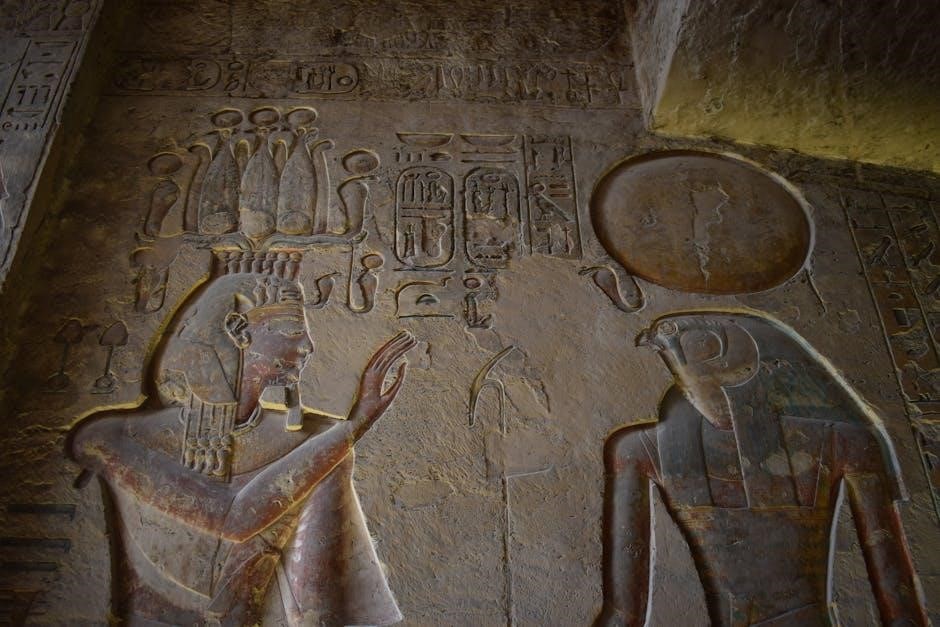The Rechabites were a fascinating group known for their unique customs and historical significance. Descendants of Jonadab, they played a notable role in biblical narratives and beyond.
1.1. Who Were the Rechabites?
The Rechabites were a distinctive group known for their unique customs and traditions. Descendants of Jonadab, son of Rechab, they adhered to a strict lifestyle that included abstaining from wine and living in tents. Their origins trace back to biblical times, with notable references in 2 Kings 10 and Jeremiah 35. The Rechabites were often portrayed as a symbol of piety and fidelity to their ancestral vows. Their lifestyle, emphasizing simplicity and separation from worldly indulgences, set them apart in ancient Near Eastern society. This group played a significant role in biblical narratives, often serving as a moral example. Their story has endured, fascinating scholars and inspiring religious reflections across centuries.
1.2. Historical Significance of the Rechabites
The Rechabites hold a unique place in history due to their steadfast adherence to ancestral traditions. Their commitment to simplicity, sobriety, and a nomadic lifestyle made them a notable example of fidelity. Biblical accounts, particularly in Jeremiah 35, highlight their refusal to conform to societal norms, making them a moral beacon. Their interactions with key figures like Jehu and Jeremiah underscore their influence during pivotal moments in ancient Israel. The Rechabites’ story transcends their historical context, inspiring reflections on piety and cultural identity. Their narrative has also been preserved in early Christian texts, such as the History of the Rechabites, ensuring their legacy endures as a symbol of unwavering dedication to faith and tradition.
1.3. Overview of the History of the Rechabites PDF
The History of the Rechabites PDF provides a comprehensive account of this enigmatic group, tracing their origins, customs, and spiritual significance. Rooted in early Jewish traditions, the text was later adapted into early Christian narratives, offering insights into their unique lifestyle. The PDF details their adherence to sobriety, nomadic existence, and isolation from worldly indulgences. It also explores their interaction with figures like Zosimus, who encountered them in a paradisiacal setting. Available in Syriac, Greek, and English translations, the document bridges cultural and religious contexts, making it a valuable resource for understanding the Rechabites’ enduring legacy. This PDF serves as a testament to their historical and moral impact, preserving their story for modern scholarship and reflection.
Origins of the Rechabites
The Rechabites trace their lineage to Jonadab, a figure mentioned in 2 Kings and 1 Chronicles. Their name reflects their ancestral heritage and unique customs, rooted in biblical traditions.
2.1. Descendants of Jonadab
The Rechabites were direct descendants of Jonadab, a biblical figure known for his piety and adherence to strict customs. Jonadab, mentioned in 2 Kings 10 and 1 Chronicles 2:55, was a respected leader whose lineage became synonymous with a unique way of life. The Rechabites followed his teachings closely, abstaining from wine and living in tents, reflecting their commitment to a nomadic and ascetic lifestyle. Their origins are deeply rooted in biblical tradition, with their name itself serving as a reminder of their ancestral heritage. This lineage not only shaped their identity but also influenced their role in broader biblical narratives, making them a fascinating subject of study in religious and historical contexts.
2.2. Early Biblical References
The Rechabites are first mentioned in 2 Kings 10, where Jehonadab, a Rechabite, aligns with Jehu during his purge of Baal worshippers. This passage highlights their early prominence and distinct identity. In 1 Chronicles 2:55, they are noted as scribes living in Jabez, indicating their integration into Israelite society while maintaining unique customs. Jeremiah 35 further details their commitment to abstinence from wine and a nomadic lifestyle, as instructed by Jonadab. These biblical references establish the Rechabites as a group with deep roots in Israelite history and a steadfast adherence to their ancestral traditions, setting the stage for their broader cultural and religious significance.
2.3. The Role of Jehonadab in 2 Kings 10
Jehonadab, a prominent Rechabite leader, played a pivotal role in 2 Kings 10 by supporting Jehu during his campaign against the worshippers of Baal. Jehonadab’s alliance with Jehu underscored the Rechabites’ commitment to monotheistic worship and their rejection of idolatrous practices. His actions demonstrated the group’s loyalty to divine commands and their distinct identity within Israelite society. This biblical account highlights Jehonadab’s influence and the Rechabites’ adherence to their ancestral traditions, showcasing their role as a morally upright and culturally significant group in ancient Israel. This event remains central to understanding their early history and religious practices.
Biblical References to the Rechabites
The Rechabites are mentioned in 2 Kings 10, 1 Chronicles 2:55, and Jeremiah 35, highlighting their origins, customs, and significance in biblical narratives.

3.1. The Rechabites in 2 Kings 10
In 2 Kings 10, the Rechabites are introduced through Jehonadab, a leader who allies with Jehu against the house of Ahab. This passage highlights their distinct identity and customs, showcasing their loyalty to God and adherence to a unique lifestyle. The Rechabites’ commitment to simplicity and separation from worldly practices is emphasized, reflecting their origins as descendants of Jonadab. This biblical reference underscores their role as a morally upright group, setting them apart in ancient Israelite society. Their appearance in this context provides a foundational understanding of their values and traditions, which are further elaborated in other biblical texts like Jeremiah 35.
3.2. The Rechabites in 1 Chronicles 2:55
The Rechabites are mentioned in 1 Chronicles 2:55 as being among the Kenites, a group associated with the tribe of Judah. This passage highlights their role as scribes, indicating their integration into Israelite society while maintaining a distinct identity. The Rechabites’ connection to the Kenites underscores their unique cultural and historical position, blending their ancestral heritage with their religious and social practices. This reference provides insight into their broader societal role and complements their portrayal in Jeremiah 35, where their customs and faith are further detailed. Their presence in Chronicles emphasizes their enduring legacy and adaptation within ancient Israelite communities.
3.3. The Rechabites in Jeremiah 35
Jeremiah 35 provides a detailed account of the Rechabites, highlighting their unique customs and faithfulness to their ancestral traditions. The prophet Jeremiah invited them to drink wine in the Temple, but they refused, adhering to Jonadab’s command to abstain from wine and living in tents as nomads. This obedience stood in stark contrast to the Israelites’ disobedience, making the Rechabites a moral example. Their commitment to simplicity and separation from the world underscored their distinct identity and spiritual dedication. This chapter is pivotal in understanding their cultural practices and their role as a symbol of fidelity in biblical narrative.

Cultural and Historical Context
The Rechabites’ unique lifestyle, emphasizing simplicity and abstinence from wine, reflects their nomadic traditions and deep-rooted faith, shaping their identity in ancient Near Eastern societies.
4.1. The Rechabites’ Customs and Lifestyle
The Rechabites were known for their distinctive customs and lifestyle, which reflected their commitment to simplicity and faith. They abstained from drinking wine and avoided agricultural pursuits, living in tents as migrants. Their nomadic existence was rooted in their religious beliefs, emphasizing separation from worldly comforts. This unique way of life, passed down through generations, underscored their identity as a people set apart. Their practices, such as not cultivating the land, highlighted their devotion to a life of purity and spiritual focus. These customs not only defined their cultural identity but also served as a moral example, inspiring admiration and curiosity in ancient and modern observers alike.
4.2. The Journey of Zosimus and the Rechabites
Zosimus’s journey to the Rechabites is a pivotal narrative in their history. He traveled for 40 days, enduring a challenging voyage, until he was miraculously carried over a vast sea by trees. Upon reaching an island paradise, he encountered the Rechabites, who lived in harmony with nature and maintained their unique customs. Their angelic appearance and virtuous lifestyle deeply impressed Zosimus, who documented their story. This journey highlights the Rechabites’ isolation and purity, serving as a testament to their unwavering commitment to their faith. The account of Zosimus not only showcases their way of life but also underscores their spiritual significance in early Christian literature.
4.3. The Rechabites as a Moral Example
The Rechabites served as a moral example, embodying piety and faithfulness. Their commitment to abstaining from wine and living in tents reflected their devotion to a simple, disciplined life. Early Christian texts often highlighted their virtues, portraying them as a model of spiritual dedication. Their adherence to Jonadab’s teachings demonstrated unwavering loyalty, making them a symbol of moral integrity. This image resonated deeply in religious contexts, inspiring admiration and emulation. The Rechabites’ way of life continues to be seen as a testament to the power of faith and discipline, offering timeless lessons in morality and devotion.

The Narrative of Zosimus
Zosimus’s journey to the Rechabites’ island paradise, described in the History of the Rechabites PDF, highlights their unique lifestyle and enduring spiritual legacy.
5.1. Zosimus’s Encounter with the Rechabites
Zosimus, a Byzantine Christian, embarked on a 40-day journey, carried by trees across a vast sea to an island paradise inhabited by the Rechabites. He found them living naked yet angelic, adhering to their ancient customs of tent-dwelling, migration, and abstaining from wine. Their lifestyle, rooted in simplicity and devotion, deeply impressed Zosimus. This encounter, detailed in the History of the Rechabites PDF, highlights their unique piety and serves as a moral example. The narrative underscores their commitment to a nomadic, ascetic life, reflecting their covenant with Jonadab. Zosimus’s tale remains a fascinating account of their enduring legacy and spiritual significance.
5.2. The Island Paradise of the Rechabites
Zosimus’s narrative describes the Rechabites inhabiting an island paradise, a serene and untouched land. The island, reached after a 40-day journey, was depicted as a place of natural beauty and tranquility. The Rechabites lived naked yet radiated an angelic purity, embodying a life of simplicity and devotion. Their abode symbolized a return to Edenic innocence, untouched by the corruption of the world. This island paradise, as detailed in the History of the Rechabites PDF, served as a refuge where they maintained their ancient customs and spiritual practices. Their lifestyle reflected a deep commitment to purity and simplicity, making the island a sacred space in their story.
5.3. The Spiritual Significance of the Rechabites’ Story
The Rechabites’ narrative holds profound spiritual significance, emphasizing purity, simplicity, and devotion. Their commitment to abstaining from wine and living as migrants reflected a deep spiritual discipline. The story of their island paradise, as described in the History of the Rechabites PDF, symbolizes a return to an Edenic state of innocence and harmony with nature. Their way of life served as a moral and spiritual example, inspiring reflection on faith, obedience, and detachment from worldly desires. The Rechabites’ story has been interpreted as an allegory for spiritual renewal and the pursuit of a divine connection, resonating across various religious traditions and texts.

The History of the Rechabites Text
The History of the Rechabites is preserved in Syriac, Greek, and English versions, offering insights into their unique lifestyle and spiritual journey. This text, based on Jewish tradition, recounts Zosimus’s encounter with the Rechabites, detailing their island paradise and moral example, and is available as a free PDF download.
6.1. Early Christian Texts and the Rechabites
The History of the Rechabites is an early Christian text rooted in Jewish tradition, detailing the story of Zosimus, a Christian who encountered the Rechabites. This narrative describes Zosimus’s 40-day journey across a vast sea to an island paradise, where he found the Rechabites living a life of piety and simplicity. The text highlights their unique customs, such as abstaining from wine and living in tents, and portrays them as a moral example. This account, preserved in Syriac, Greek, and English versions, provides valuable insights into their spiritual and cultural practices, making it a significant resource for understanding their legacy.
6.2. The Syriac Version of the History of the Rechabites
The Syriac version of the History of the Rechabites is one of the most important manuscripts preserving the story of Zosimus’s encounter with the Rechabites. This text, rooted in Jewish tradition, was later adapted into early Christian literature. It describes Zosimus’s journey to an island paradise where he found the Rechabites living a life of piety, abstaining from wine, and dwelling in tents. The Syriac version is notable for its detailed narrative and is available as a PDF for scholarly study. It has been compared to early Midrash and offers insights into the cultural and spiritual practices of the Rechabites, making it a vital resource for understanding their legacy in both Jewish and Christian traditions.
6.3. The Greek and English Translations
The Greek and English translations of the History of the Rechabites provide valuable insights into the narrative of Zosimus and the Rechabites. The Greek version, included in published volumes, offers a scholarly perspective, while the English translation makes the text accessible to a broader audience. Both versions highlight the Rechabites’ unique customs, such as their abstinence from wine and their nomadic lifestyle. These translations are essential for understanding the cultural and religious significance of the Rechabites, as they bridge ancient traditions with modern readability. The English translation, in particular, has facilitated the study of the Rechabites’ story, ensuring their legacy endures in contemporary scholarship and religious discourse.

Scholarly Studies and Analysis
Scholarly studies on the Rechabites include comparisons with early Midrash and analysis of their role in the Book of Mormon, highlighting their significant cultural impact.
7.1. The Rechabites in Modern Scholarship
Modern scholarship has revisited the Rechabites, exploring their cultural and textual history. Studies compare their narrative to early Midrash, such as Mekhilta de-Rabbi Shimon ben Yochai, revealing shared themes. The History of the Rechabites has been analyzed for its spiritual significance and its potential influence on later religious texts, including the Book of Mormon. Researchers have also examined the Rechabites’ customs and their portrayal as a moral example in early Christian and Jewish traditions. This scholarly interest highlights the enduring relevance of the Rechabites’ story, bridging ancient and modern interpretations while shedding light on their unique place in religious and cultural history.
7.2. Comparisons with Early Midrash
Scholarly comparisons have drawn parallels between the History of the Rechabites and early Midrash, such as Mekhilta de-Rabbi Shimon ben Yochai. Both texts explore themes of faith, obedience, and divine reward, often through narrative expansions of biblical accounts. The Rechabites’ story, with its emphasis on ethical living and spiritual purity, aligns with Midrashic interpretations that seek to illuminate moral and theological lessons. Researchers note similarities in narrative style, such as the use of dialogues and symbolic imagery, which enrich the storytelling and convey deeper spiritual truths. These comparisons offer insights into how ancient Jewish traditions influenced early Christian texts like the History of the Rechabites, highlighting shared cultural and religious motifs.
7.3. The Rechabites and the Book of Mormon
The History of the Rechabites has been studied in relation to the Book of Mormon, with scholars exploring potential textual and thematic connections. John W. Welch, for instance, has examined how the narrative of Zosimus and the Rechabites might support claims of ancient Near Eastern origins for the Book of Mormon. While the Rechabites are not directly mentioned in the Book of Mormon, parallels in themes such as covenant-keeping, obedience, and divine guidance have sparked scholarly interest. Some researchers argue that linguistic and narrative similarities suggest a shared cultural or literary heritage. These comparisons remain a topic of debate, offering insights into how ancient texts might influence later religious writings.
The Rechabites in Comparative Religion
The Rechabites appear in Jewish, Christian, and Islamic traditions, often symbolizing piety and obedience. Their customs and beliefs are compared across religious texts for deeper insights.
8.1. The Rechabites and Jewish Tradition
The Rechabites hold a significant place in Jewish tradition, often portrayed as a paradigm of faithfulness and obedience. Their origins trace back to Jonadab, a figure in 2 Kings 10, and their unique lifestyle, avoiding wine and living in tents, reflects their commitment to ancestral teachings. In Jeremiah 35, they are commended for adhering to their vows, symbolizing piety. Jewish texts often highlight their resilience and moral integrity, making them a symbol of devotion; Their story has been studied in various Jewish scholarly works, emphasizing their role as a model of steadfastness in faith and practice.
8.2. The Rechabites and Early Christianity
The Rechabites’ story deeply resonated in early Christianity, as seen in texts like the History of the Rechabites. This narrative, rooted in Jewish tradition, was adapted by Christians to illustrate ascetic ideals. Zosimus’s encounter with the Rechabites, depicted as living in an island paradise, symbolized a life of purity and devotion. Early Christian writers often highlighted their refusal to consume wine and their nomadic lifestyle as models of spiritual discipline. Their adherence to vows was seen as a reflection of Christian virtues, making them a moral example for early believers. This connection underscores the Rechabites’ enduring influence across religious traditions, bridging Jewish and Christian thought.
8.3; The Rechabites in Islamic Sources
The Rechabites are not explicitly mentioned in Islamic sources, but their story resonates with themes found in Islamic tradition. Their piety, ascetic lifestyle, and commitment to divine commandments align with Islamic values of submission and righteousness. While there is no direct reference to them in the Quran or Hadith, their legacy as a morally upright group could be seen as paralleling Islamic ideals of faith and discipline. This connection highlights the broader cultural and religious significance of the Rechabites, transcending specific religious traditions.
The Rechabites’ Legacy
The Rechabites’ legacy endures as a symbol of faith and discipline, inspiring modern religious movements and cultural depictions in art and literature.
9.1. The Rechabites as a Symbol of Piety
The Rechabites are often regarded as a symbol of piety due to their unwavering commitment to a simple, disciplined lifestyle. Their rejection of material comforts and dedication to abstaining from wine, as well as their nomadic existence in tents, reflected a profound devotion to their faith. This steadfast adherence to their customs, rooted in the teachings of Jonadab, set them apart as a moral and spiritual example. Their story, particularly as narrated by Zosimus, portrays them as a people living in harmony with divine will, embodying virtues of obedience and self-denial. This image has resonated across centuries, making them a enduring symbol of faith and piety.
9.2. The Rechabites and Modern Religious Movements
The Rechabites’ austere lifestyle and commitment to their faith have inspired parallels in modern religious movements. Their emphasis on simplicity, communal living, and adherence to strict moral codes resonates with groups promoting similar values. Some contemporary religious movements, particularly those emphasizing ascetic practices or a return to ancient traditions, draw inspiration from the Rechabites’ example. Their rejection of materialism and focus on spiritual purity align with ideals found in certain modern faith communities. Additionally, the Rechabites’ story has been invoked in discussions about the importance of maintaining cultural and religious identity in changing times, making them a relevant figure for modern religious discourse.

9.3. The Rechabites in Art and Literature
The Rechabites have left a lasting impression in art and literature, particularly through their portrayal in early Christian texts. Their unique lifestyle and commitment to simplicity have inspired vivid depictions in religious art, often emphasizing their piety and separation from worldly comforts. Literary works, such as the narrative of Zosimus, have further cemented their image as a community living in harmony with divine will. The story of their island paradise has sparked imaginative representations in both visual and written media, making them a fascinating subject for artists and authors exploring themes of faith and moral integrity. Their legacy continues to inspire creative interpretations across cultures and time.
The Rechabites’ enduring appeal lies in their unique customs and moral example, inspiring admiration across cultures and time, leaving a lasting legacy in history and faith.
10.1. The Enduring Appeal of the Rechabites’ Story
The Rechabites’ story captivates due to its unique blend of customs, moral integrity, and historical intrigue. Their commitment to abstaining from wine and living as nomads, as detailed in the History of the Rechabites PDF, offers a fascinating glimpse into ancient traditions. The narrative of Zosimus’s encounter with the Rechabites, describing their island paradise, has inspired admiration across cultures. Their story transcends religious boundaries, resonating with Jewish, Christian, and Islamic traditions. The Rechabites’ legacy endures as a symbol of piety and resilience, making their tale a timeless inspiration for reflection and study.
10.2. The Rechabites’ Place in History
The Rechabites hold a distinct place in history, particularly within biblical and early Christian narratives. Their unique lifestyle, emphasizing abstinence from wine and a nomadic existence, set them apart in ancient Near Eastern societies. Mentioned in texts like 2 Kings and Jeremiah, they gained prominence for their steadfast adherence to Jonadab’s teachings. The History of the Rechabites PDF highlights their enduring legacy, showcasing their role as a moral example across religious traditions. Scholarly studies often explore their cultural and religious significance, with Zosimus’s narrative further cementing their intrigue. Their story bridges biblical and post-biblical eras, making them a fascinating subject for historical and theological exploration.
10.3. Final Thoughts on the History of the Rechabites PDF
The History of the Rechabites PDF offers a comprehensive exploration of their unique legacy, blending biblical accounts with early Christian traditions. This document is a valuable resource for understanding their cultural and religious significance, as well as their enduring influence across centuries. It highlights their commitment to a distinct lifestyle and their role as moral exemplars in various religious contexts. The PDF also underscores the Rechabites’ connection to broader historical narratives, making it essential for scholars and enthusiasts alike. As a concluding reflection, the History of the Rechabites PDF remains a pivotal text for unraveling the mysteries of this fascinating group and their lasting impact on religious thought and practice.


